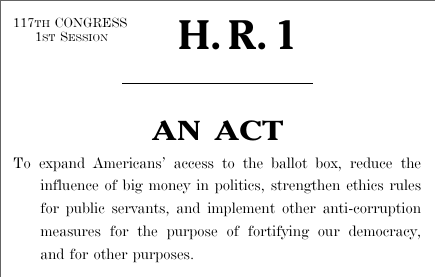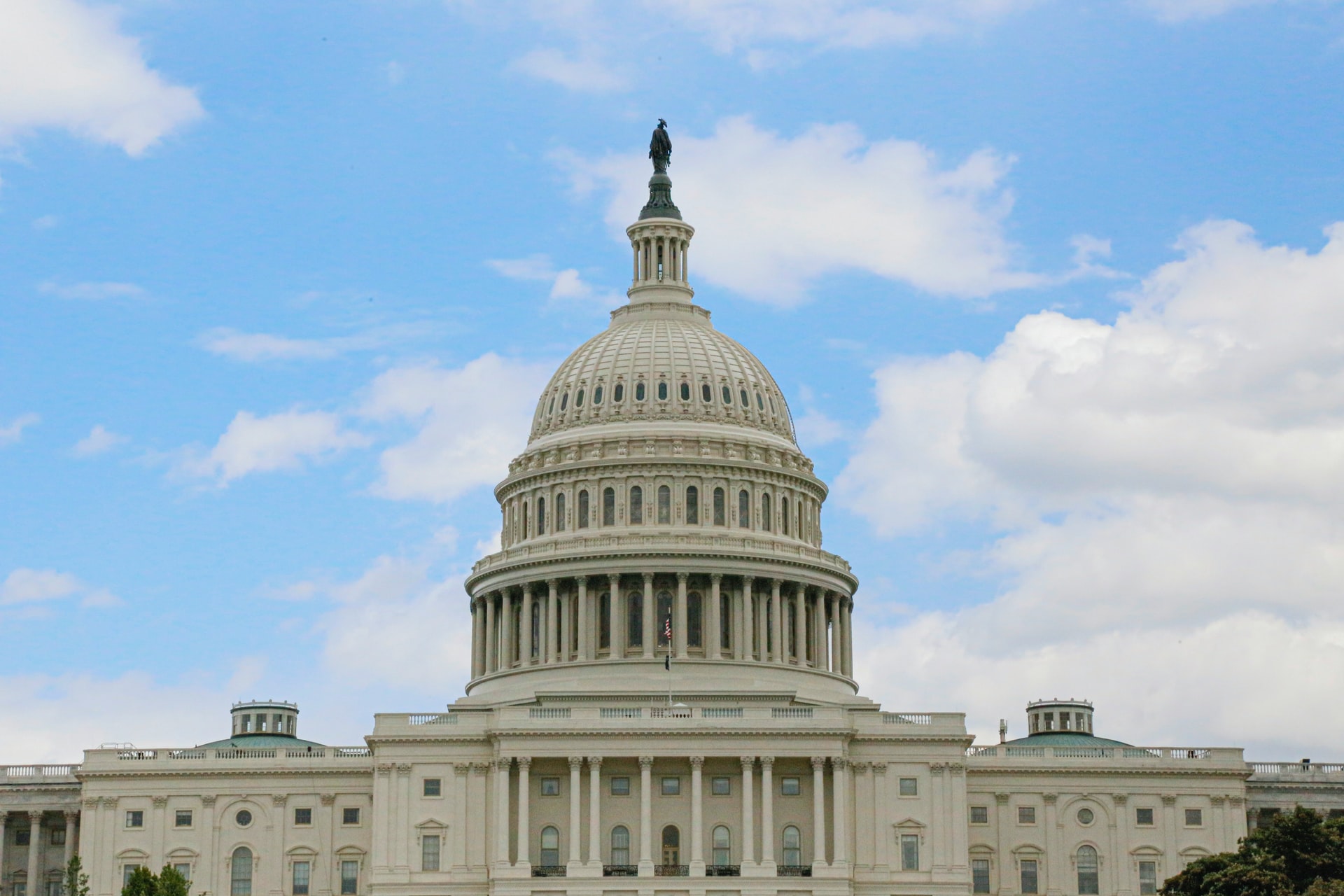There are so many issues now that I want to write about. I started one, then something else happened, and I started again in another direction. I’m going to leave gun control; mass shootings; the southern border; the possible sedition and treason of the January 6th insurrection at the Capitol; the filibuster, women’s rights, climate change and racism; and racism of all types to prime time news for now. What I am going to write about may seem mundane given the trauma of the past week, but, in fact, it has great importance for the future. These Bills have been passed by the House and have been sent to the Senate. They are acts of the current (117th) Congress. The first one is especially critical to the survival of our form of government; others include gun control, anti-discrimination, the Dreamers, and job training.
The For the People Act, H.R. 1 passed the House on March 3, 2021 and has been sent to the Senate. In the Senate it is S.R. 1 and was debated yesterday (March 24( in the Senate Rules Committee along party lines. Republicans have already said that if it passes they can’t win another election, i.e., their policies do not favor the majority of the American people. Maybe it’s time for them to re-evaluate the American people, and develop acceptable policies! What is the point of a democratic republic if you can’t win an election with a majority vote? Instead, they intend to kill the bill in the Senate with a filibuster, an outmoded, undemocratic attempt that enables one person (or one party not in power) to kill any bill. As well, many Republican-controlled states are passing reams of anti-election laws. H.R. 1 is supported by many groups including the League of Women Voters, a strong nonpartisan organization that does excellent, reliable research on many issues. Here is what H.R. 1 actually does:
“Specifically, the bill expands voter registration (e.g., automatic and same-day registration) and voting access (e.g., vote-by-mail and early voting). It also limits removing voters from voter rolls.
The bill requires states to establish independent redistricting commissions to carry out congressional redistricting.
Additionally, the bill sets forth provisions related to election security, including sharing intelligence information with state election officials, supporting states in securing their election systems, developing a national strategy to protect U.S. democratic institutions, establishing in the legislative branch the National Commission to Protect United States Democratic Institutions, and other provisions to improve the cybersecurity of election systems.
Further, the bill addresses campaign finance, including by expanding the prohibition on campaign spending by foreign nationals, requiring additional disclosure of campaign-related fundraising and spending, requiring additional disclaimers regarding certain political advertising, and establishing an alternative campaign funding system for certain federal offices.

The Equality Act, H.R. 5 passed the house on February 25, 2021. “This bill prohibits discrimination based on sex, sexual orientation, and gender identity in areas including public accommodations and facilities, education, federal funding, employment, housing, credit, and the jury system. Specifically, the bill defines and includes sex, sexual orientation, and gender identity among the prohibited categories of discrimination or segregation.
The bill expands the definition of public accommodations to include places or establishments that provide (1) exhibitions, recreation, exercise, amusement, gatherings, or displays; (2) goods, services, or programs; and (3) transportation services.
The bill allows the Department of Justice to intervene in equal protection actions in federal court on account of sexual orientation or gender identity.
The American Dream and Promise Act of 2021, H.R. 6 passed the House on March 18, 2021, has been received in the Senate on March 22, 2021 and referred to the Judiciary Committee. H.R. 6 provides access to citizenship for the “Dreamers.”
“The Department of Homeland Security (DHS) or the Department of Justice (DOJ) shall provide conditional permanent resident status for 10 years to a qualifying alien who entered the United States as a minor and (1) is deportable or inadmissible, (2) has deferred enforced departure (DED) status or temporary protected status (TPS), or (3) is the child of certain classes of nonimmigrants. The bill imposes various qualifying requirements, such as the alien being continuously physically present in the United States since January 1, 2021, passing a background check, and being enrolled in or having completed certain educational programs.
DHS shall remove the conditions placed on permanent resident status granted under this bill if the alien applies and meets certain requirements, such as completing certain programs at an educational institution, serving in the military, or being employed.
Furthermore, DHS and DOJ shall cancel the removal of certain aliens who had TPS, were eligible for TPS, or were eligible for DED status on certain dates. Such an alien shall receive permanent resident status upon meeting certain requirements and applying for such status within three years of this bill’s enactment.
DHS may not use information from applications filed under this bill or for Deferred Action for Childhood Arrivals status for immigration enforcement purposes.
National Apprenticeship Act of 2021, H.R. 447 passed the House on February 25, 2021 and was received in the Senate the same day and referred to the Committee on Health, Education, Labor, and Pensions. This is of interest as there is a shortage of skilled workers such as plumbers, electricians, and welders. H.R. 447 seems like a way to jump start this and provide an avenue for income to young people not interested in or able to afford the college route. These professions provide good incomes, often on par with white collar workers.
“The bill provides statutory authority for the Office of Apprenticeship (OA) within Labor. The OA’s responsibilities include (1) supporting the development of apprenticeship models; (2) recognizing qualified state apprenticeship agencies, and operating apprenticeship offices in states without a recognized agency; (3) providing technical assistance to state agencies; (4) periodically updating requirements for each occupation in the apprenticeship program and determining whether to approve new occupations for the program; (5) promoting greater diversity in the national apprenticeship system; and (6) awarding grants provided under this bill.
The bill also establishes in statute the responsibilities of state apprenticeship agencies and offices, including (1) providing technical assistance to stakeholders, (2) resolving complaints, (3) establishing state performance goals, and (4) including in its written plan a description of how its apprenticeship programs align with the skills needs of the state’s employers.
The OA shall enter into an agreement with the Department of Education to promote the integration and alignment of apprenticeship programs with secondary, postsecondary, and adult education.
The OA shall award grants to eligible entities to (1) expand national apprenticeship system programs, including by expanding pre-apprenticeship and youth apprenticeship programs; (2) encourage employer participation; and (3) strengthen alignment between the apprenticeship system and education providers.

The United States Capitol
